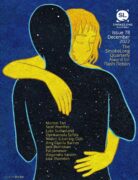I am in awe of how much of a life is portrayed in this flash. There’s the full spectrum of achievements, sins, beginnings, and endings. This story is particularly focused on endings. What inspired you to start at the end of this character’s life?
Regarding inspiration, I’m not sure how conscious all of my decisions are, but for this particular character, the end seemed like it was the most dynamic place to start. To me, endings are some of the most exciting parts of writing fiction, both for what you can imply and also leave with the reader. In this case, the main character has reached a point in his life where he believes the end is near and he’s acting accordingly in his own hedonistic way. In a sense, he’s lost the mystery and joy in the world. He’s ready for it to be done, but keeps going for some reason, albeit drunkenly. That premise seemed full of energy and promise.
The title is “Death Drive,” and Freud’s work of the same name is mentioned in the third section, which I think is brilliant. Did this analytic theory inspire the story as a whole or is it part of multiple influences?
When possible, I try not to focus too hard on a specific theme or idea when I write. Instead, I work line by line to find what has the most momentum and build that into the next part. That said, this one really started with that image of an old man drinking beer and a young man he employed to get him beer on command. I found that amusing for some reason and wanted to know more about these characters and their motivations.
However, the concept of Death Drive was definitely a major moment where I felt the story kick into gear. When I was writing this, I was struggling to find a unifying movement where the story coalesced into something beyond just the bare bones of the plot. The answer was a bit serendipitous, as I was listening to a song called “Death Drive” while editing this piece. I liked the song and Googled it, which led me to Freud’s Wikipedia page and the behavioral theory.
I was intrigued by this concept—the idea that our selfish and unwise behaviors are actually driven by an innate desire for self-destruction—which I felt would be quite alluring for a character with a lifetime of regrets. It felt relevant and helped me to set up the ending sequence of transformation and possible rebirth. And I think it worked to create a bit of a connecting force for the story.
My favorite lines in this story show authority on the page as well as off. We get a detailed description of the people on the beach, yet other lines reflect the narrator’s memory and are heavy with consequences with little to no detail. For example, this stunner line “They knew the legend of what I’d done—who I’d been—a legend that now escaped me.” How do you navigate and employ productive ambiguity in your fiction?
Ambiguity is certainly something I think about at length—which details to reveal and when to reveal them, as well as how to make these surprises satisfying. The main character seemed like a perfect place to employ ambiguity with his memory and trustworthiness. As you mentioned, there’s the whole issue of his past—he claims that he doesn’t remember his “legend” but then outlines very specific scenarios immediately after. On a similar note, he tells us that he wrote a book on the Death Drive, but we never really get a sense of what conclusions the book arrived at. These moments seemed like the scaffolding for not only moving the story along but setting up an ending full of possibilities.
Hopefully, by the time we get to the ending, the untrustworthy narrative causes you to question what exactly is happening with his “rebirth.” Rather than give us a conclusive ending, I wanted to raise more questions—does he deserve redemption? Is he dying? Has he been brought back to life by this young woman? I have no firm answer. But it’s interesting to create a scene that could mean many things to the reader depending on their interpretation and what they might get from the story. And again, I hope it will be satisfying above all else.
Finally, a two-part question. Sentences and paragraphs in this story contain multitudes. Entire years described and alluded to with finesse. One could say—and I know short form writers wince at this phrase, and being a short form writer myself, I certainly do—that this story is “novel worthy.” Why did flash fit for this story, this character?
For this story, I wanted to capture a day in the life of this character and allow the readers to experience his strangeness in the moment. He’s facing some major existential crises and regrets, and it felt more prudent to briefly touch on many of them, rather than get bogged down in flashbacks and exposition. As I edited the story, it kept getting shorter and shorter, and eventually, I realized that the energy really maintained itself when I stuck with the flash form.
And going off of that, what do you enjoy about flash fiction that spans lifetimes or ages?
Again, I’m quite interested in stories that can take the emotional impact of a lifetime and somehow compress it into one thousand words. There’s an element of “stickiness” in good flash fiction that leaves me thinking about a story long after I’ve read it, while many longer pieces fade from my memory. I think it goes back to that idea of focusing on the most powerful moments and discarding the rest. It’s a tall task, but I truly admire writers who are able to pull this off and find that it’s a common element in my favorite stories.


